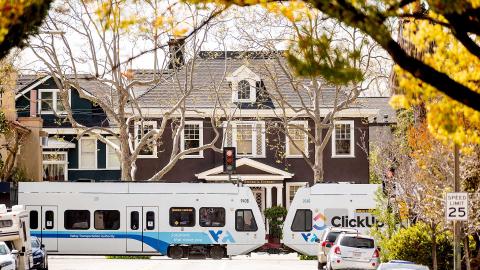
Two of the Bay Area’s largest cities soon will have new mayors as a result of the Nov. 8 elections, which will change the makeup of the Metropolitan Transportation Commission.
In San Jose, the mayoral race saw Matt Mahan edging out Cindy Chavez, who is an MTC Commissioner representing the Santa Clara County Board of Supervisors. Current San Jose Mayor and MTC Commissioner, Sam Liccardo, was termed out of office. Liccardo is the vice chair of the Joint MTC/ABAG Legislation Committee. Commissioner Chavez will remain on the Commission as an Appointee of Santa Clara County
In Oakland, Sheng Thao will take over the mayor’s post from MTC Commissioner Libby Schaaf, who also was termed out. Schaaf is the current Chair of the Bay Area Housing Finance Authority Oversight Committee.
Mayor-elect Mahan and Mayor-elect Thao may either name themselves as their cities’ mayor’s appointees to the Commission or they may appoint another member of their city council.
The election delivered some significant wins for MTC/ABAG priorities, including several measures at the local level to sustain and increase resources available for transportation improvements and affordable housing.
Bay Area Local Measure Highlights:
- San Francisco voters approved Proposition L, renewing an existing half-cent sales tax dedicated to transportation for another 30 years. The measure funds a host of projects from local road repairs to paratransit to transit maintenance and electrification as well as providing funding for major regional priorities like the Caltrain Downtown Extension (DTX) and BART Core Capacity.
- City of Oakland voters approved Measure U, a general obligation bond for affordable housing preservation ($350 million), transportation projects ($290 million) and other facility upgrades ($210 million).
- About a dozen Bay Area cities successfully pursued general taxes across a range of sources (sales tax, transit occupancy tax, business license tax) with advisory language referencing infrastructure, such as street repairs and affordable housing. Notably, Vallejo voters approved the “Safe Streets and Essential Services Measure,” a general 0.875 percent sales tax that will generate approximately $18 million per year.
- “Article 34” affordable housing authorization measures were on the ballot in Berkeley, Oakland and South San Francisco (Measures N, Q, and AA respectively) and all passed. Article 34 of the California Constitution requires that local governments secure majority voter approval for development of affordable housing projects for which over 49 percent of the units are restricted to affordable housing. Voters statewide will have an opportunity to repeal this 70-year-old requirement in the November 2024 election.
- Voters also approved several local measures aimed at reducing evictions. These include Measure P in Richmond, which caps annual rent increases at 3 percent or 60 percent of the inflation rate, whichever is lower. In Oakland, voters approved Measure V to prohibit no-fault evictions of children and educators during the school year and extended eviction protection to tenants in RVs and tiny homes on wheels on private property. In Berkeley and San Francisco, voters approved vacancy taxes aimed at getting more existing units on the market.
Measures that fell short:
- Prop 30 and Berkeley’s housing bond. Despite 59 percent of City of Berkeley reported voters supporting its ambitious $650 million affordable housing and infrastructure bond (Measure L), the measure fell short of the achieving the 2/3 vote threshold required.
- Proposition 30 – endorsed by ABAG and MTC – went down to a defeat, with 58 percent of voters rejecting it. The measure was supported in Alameda County, the City and County of San Francisco, and neighboring Santa Cruz and Monterey counties along with Alpine, Humboldt, Mendocino and Yolo counties. The measure would have provided approximately $3.5 billion to $5 billion annually for 20 years to assist with the transition to zero-emission vehicles (passenger and medium-heavy duty) and wildfire prevention and response. Governor Newsom’s opposition to the measure on the grounds that it was primarily a “special interest” measure to benefit the ridesharing company Lyft was a fatal blow.



Submit your comment
In order to receive a reply to your comment, please provide an email address.